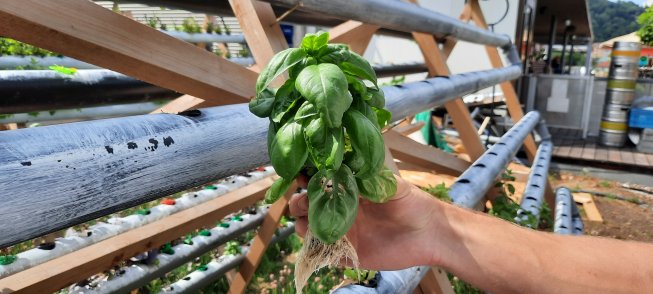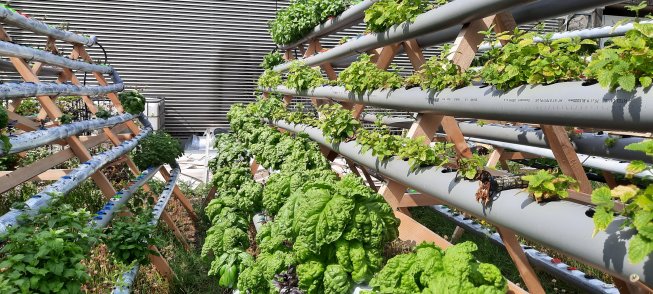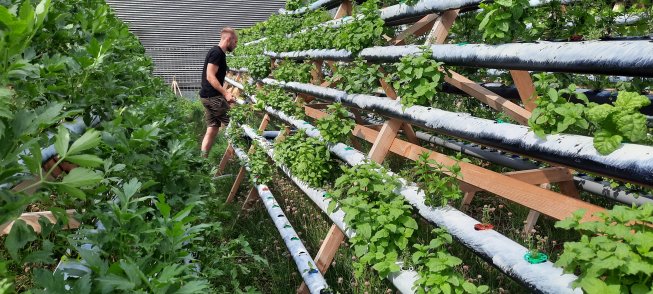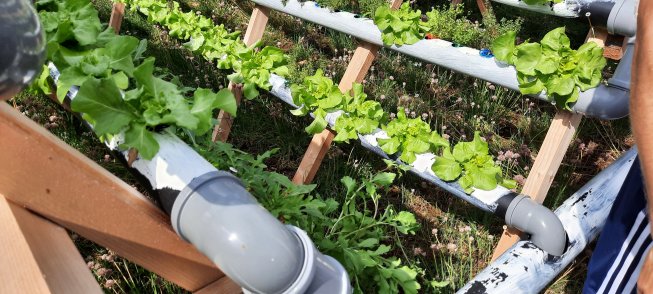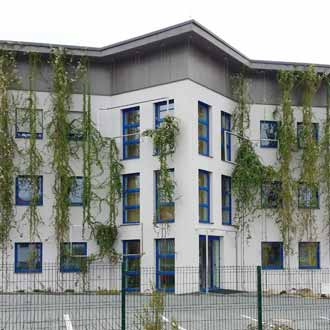Edible roof gardens by Forestbit
30 June 2021
This is a Forestbit project.
The plants are grown in a hydroponic environment. Water enriched with the necessary nutrients is pumped from the tank into the pipes, which are fixed to the wooden structure, and it then flows back into the water tank through the pipes due to gravity.
The system is automated, the concentration of nutrients in the water is measured and the addition of fertilizers and water can be controlled remotely.
The company delivers the entire turnkey solution to its clients, which can be shopping centers, but not only those that will subsequently ensure the sale of plants. In addition to the initial installation, they also train employees and provide long-term remote technical service.
The solution helps in a given location like any other green roof. Thanks to the evaporation of water, the temperature in urban agglomerations decreases, living comfort increases due to the amount of greenery, and even from an aesthetic point of view, such an edible roof is simply beautiful. During the season, residents can get food from their place of residence, with a minimum carbon footprint, and completely fresh. Stores don't have to spend money on storage, they just reap just what they currently need.
In controlled hydroponics, plants grow significantly faster and better than in soil, the composition of which is debatable. The aquatic environment can be easily supplemented with the necessary nutrients, the ratio of which can be easily controlled.
When asked whether growing vegetables in the city is safe and appropriate, Jan Tesař, CEO of Forestbit, answers that according to the chemical analysis at VSCHT on polycyclic aromatic hydrocarbons, the results for this method of procuring vegetables are good, the plants do not exceed any permitted limits. This is also due to the fact that the fumes from cars are kept more on the ground and growing on roofs is actually outside this congested zone. In addition, in larger cities, there is no problem with solid fuel heating fumes, as they are simply banned.
The guys of Forestbit go even further in their ecology by using naturally degradable baskets for young plants inserted into the hydroponic system.
A nice example of the clever use of technology for practical use.
Original article:
CZ:
Na střeše OC Nový Smíchov proběhl v roce 2021 pilotní projekt pěstování salátů a bylinek v hydroponickém prostředí.
Jedná se o projekt firmy Forestbit.
Rostliny jsou pěstovány v hydroponickém prostředí. Do trubek, které jsou upevněny na dřevěné konstrukci, je z nádrže čerpadlem vháněna voda obohacená o potřebné živiny a ta pak díky gravitaci trubkami protéká zpět do nádrže s vodou.
Systém je automatizován, měří se koncentrace živin ve vodě a vzdáleně je možno řídit přidávání hnojiv i vody.
Firma dodává celé řešení na klíč svým klientům, kterými mohou být obchodní centra, ale nejen ta, která si následně zajistí odbyt výpěstků. Kromě prvotní instalace také proškolí zaměstnance a poskytne dlouhodobou vzdálenou technickou správu.
Řešení pomáhá v dané lokalitě jako jakákoli jiná zelená střecha. Díky odparu vody se snižuje teplota v městských aglomeracích, zvyšuje se komfort bydlení díky množství zeleně a i z estetického hlediska je taková jedlá střecha prostě krásná. Během sezony tak mohou obyvatelé získat potraviny z místa bydliště, s minimální uhlíkovou stopou, a naprosto čerstvé. Obchody nemusí vynakládat finance na skladování, prostě sklidí jen to, co aktuálně potřebují.
V řízené hydroponii rostou rostliny výrazně rychleji a lépe než v hlíně, jejíž složení je diskutabilní. Vodní prostředí lze snadno doplnit o potřebné živiny, jejichž poměr lze bezproblémově řídit.
Na otázku, zda je pěstování zeleniny ve městě bezpečné a vhodné, odpovídá Jan Tesař, CEO firmy Forestbit, že dle rozboru VŠCHT na polycyklické aromatické uhlovodíky vychází výsledky pro tento způsob obstarávání zeleniny pozitivně, rostliny nepřekračují žádné povolené limity. Je to dáno také tím, že zplodiny z aut se drží více u země a pěstování na střechách je vlastně mimo tuto zatíženou zónu. Navíc ve větších městech není problém se zplodinami z topení pevnými palivy, protože jsou jednoduše zakázané.
Ekologii jdou pánové z Forestbit ještě více v ústrety tím, že pro mladé rostlinky vkládané do hydroponického systému používají přírodně odbouratelné košíčky.
Pěkná ukázka chytrého využití technologií pro praktický užitek.



